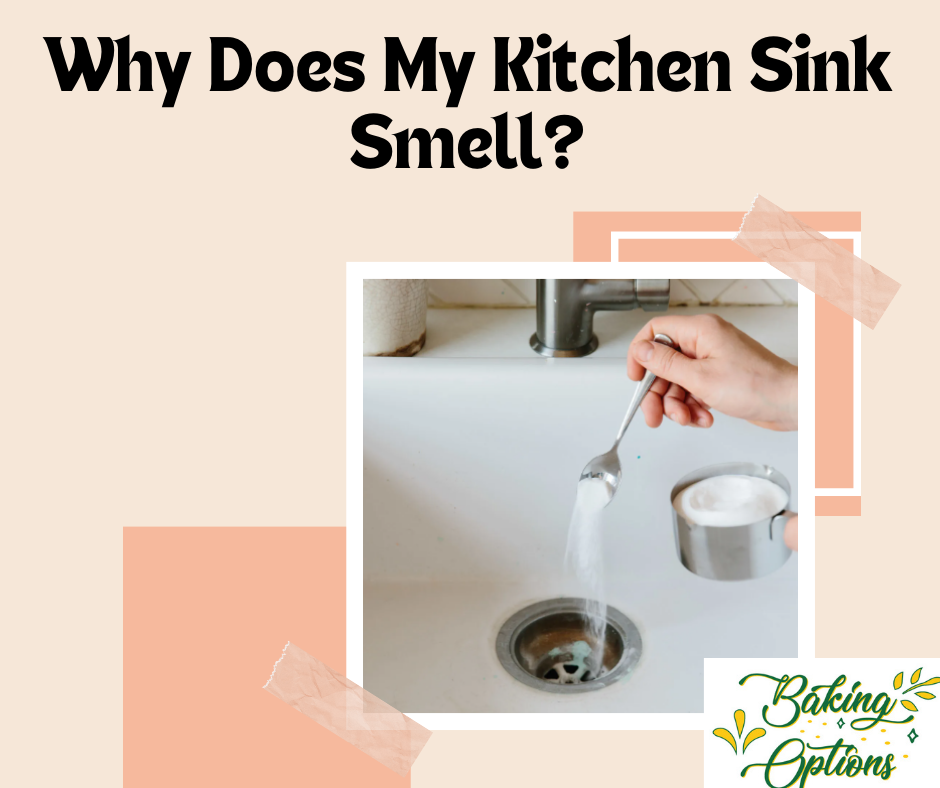If you enjoy baking and cooking, kitchen cleanliness is also important. That’s the reason I chose this subject to provide you some advice on kitchen cleaning.
Great cooking is usually indicated by a smell coming from the kitchen. The majority of homeowners take great pleasure in preparing delicious meals. When someone is preparing a dish, the aroma that comes from so many delectable foods can definitely bring back a lot of memories. Sadly, some smells coming from the kitchen aren’t always so wonderful.
There are several causes for a kitchen sink to smell. One of the most frequent causes is food or grease buildup in the kitchen sink’s drain, which can lead to the growth of bacteria and an unpleasant stench.
However, I will also go over a few other reasons in this post. And explain to you how to get rid of this odor. Thus, continue scrolling!
Contents
Reasons of Kitchen Sink Smells Like Sewage
If you are experiencing unpleasant drain and sink smells in your kitchen, you should try to identify the source of the odor as soon as possible.
You can take action to solve the issue and possibly quickly restore the fresh scent to your kitchen once you’ve determined what’s causing the smell.
Mold and Mildew
Possible leaks beneath the sink could result in the growth of mold and mildew. It’s possible that the scent you’re smelling is coming from under the sink rather than the sink itself. Since drains frequently come into contact with water, mold and mildew have a favorable environment in which to flourish.
It is in damp, warm, and gloomy places where mold and mildew grow. Even though pipes don’t always stay warm when hot water isn’t being used, mold can grow in them because of germs.
Bacteria and Rotting Food
Food particles could get lodged in the garbage disposal if you wash food scraps and soda down your kitchen sink. These objects may decompose and release an unpleasant odor from your garbage disposal, which could result in unpleasant odors emanating from your kitchen sink.
Food particles and hair will eventually leave a residue on your plumbing when you rinse them down the sink. Bacteria will start to proliferate as food particles and other objects adhere to the inner walls of your plumbing. There could be a bacterial odor coming from even the cleanest sink.
Dry P-trap
The p-trap is not well known to householders. All of the sinks in your house have p-traps placed beneath them. Its primary function is to catch debris before it enters the drain. This keeps clogs from growing deep within plumbing systems and avoids a clogged drain.
Additionally, it prevents the smell of sewer gas from entering the house. Odors from detritus-like food particles that have become trapped are emitted when the p-trap becomes excessively dry.
Clogged Vent
At least one principal vent in every home exits via the roof. According to most local ordinances, this must have a minimum four-inch diameter and all fixtures must have vents.
If the vent is obstructed, the gasses that are supposed to assist water in passing through your pipes become blocked. The places where the pipes have apertures allow the trapped gas to be discharged. As a result, when food and water drain from the sink, they stop or slow down, and an unpleasant smell comes out.
How to Clean Your Smelly Kitchen Sink

Vinegar and Baking Soda
Using a vinegar and baking soda mixture is one method. Baking soda works wonders for getting rid of grease and filth, while vinegar is a natural disinfectant. Combine one part vinegar with three parts water to form the mixture. Transfer the blend into a spray bottle and mist the surface of the sink with it.
After a few minutes, use a moist cloth to remove the vinegar. After that, apply some baking soda to the vinegar-sprayed area and let it sit for five to ten minutes. Once the baking soda has been removed with a damp towel, thoroughly rinse the sink with warm water.
Use Lemon and Orange Citrus Peels
You can clean your sink and leave a lovely, natural scent behind by using the peels from lemons, limes, or oranges. Grind the peels or throw them in the garbage and let their natural oils and cleansing qualities do the talking.
Pour in a lot of cold water afterward to completely clean the grinder. For even greater effects, mix citrus peels with ice cubes.
Use Ice Cubes Mixed
The blades in your sink grinder can be sharpened and cleaned with the use of salt and ice cubes. Throw some ice cubes and a couple of tablespoons of salt down the garbage disposal. When you turn on the grinder, the ice and salt’s abrasive properties will assist clear the blades of debris.
To eliminate the leftovers, rinse with water thereafter. As mentioned above, for even better results, add some citrus peels.
Boiling Hot Water
Fill the drain with hot water if you think there may be a blockage. Short bursts of hot water quickly dissolve small blockages. At a minimum, larger obstructions become smaller in size.
Add some essential oils or lemon juice to the water before you pour it in to instantly eliminate offensive odors and maintain a fresh scent throughout your house.
Clean Your P-trap
The alternative is to take out the P-trap from under your kitchen sink and use hot water and soap to clean it. Wearing rubber gloves is important for this task since direct exposure to extremely hot water can cause polymers to degrade.
Take care not to splash the soiled water when emptying the trap. You might want to use an old scrub brush of some kind instead of your hand if there’s a lot of food or grease in your trap.
Clear the Venting Pipes
Examine how much debris is on your roof. Is it abundant? If so, your venting pipes might be blocked. Even when people try to remove debris themselves, it’s usually advisable to hire someone to help clear the roof. Experts are aware of the correct locations to check for obstructions in venting pipes.
Tips to Maintain a Clean Kitchen Sink

Maintaining a clean kitchen sink is essential for hygiene and efficiency. Here are some of my personal tips to help keep your sink sparkling clean:
Daily Habits
- Rinse After Use: Make it a habit to rinse the sink with hot water after each use to prevent residue build-up.
- Wipe Down Regularly: Use a sponge or cloth to wipe down the sink, faucet, and surrounding areas daily. This helps remove food particles and water spots.
- Dispose of Food Scraps Properly: Avoid letting food scraps go down the drain. Use a sink strainer to catch debris and empty it into the trash or compost.
Weekly Cleaning
- Deep Clean with Baking Soda and Vinegar: Sprinkle baking soda over the sink and scrub with a sponge. Rinse with vinegar to create a fizzy reaction that helps remove stains and odors.
- Sanitize: Use a disinfectant or a mixture of water and bleach (1 tablespoon bleach to 1 gallon of water) to sanitize the sink.
- Polish Stainless Steel Sinks: For stainless steel sinks, use a specialized cleaner or a mixture of vinegar and water to polish and remove water spots.
Monthly Maintenance
- Clean the Drain: Pour a mixture of baking soda and vinegar down the drain, followed by boiling water, to help clear clogs and remove odors.
- Check the Disposal: If you have a garbage disposal, grind a few ice cubes and citrus peels to freshen and sharpen the blades.
- Address Hard Water Stains: Use a mixture of vinegar and water to tackle hard water stains. When cleaning and rinsing, give it a few minutes to settle.
Bottom Lines
Maybe you are surprised after reading this article at how I have technical knowledge about it. Basically, I have a friend who works for a plumbing company.
He has shared some technical knowledge about kitchen sink cleaning with me. That’s why I have written this post for my readers. I hope this article will be helpful for you!
See also: How to Sharpen a Serrated Knife

